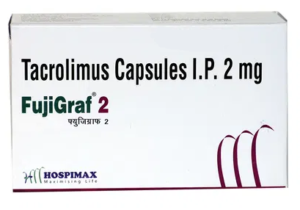The Benefits of Fujigraf 2 Capsule in Organ Transplant Patients
Understanding Fujigraf 2 Capsule: Preventing Organ Rejection after Transplantation
 Fujigraf 2 Capsule is a prescription medication used to prevent organ rejection after transplantation, like liver, kidney, or heart transplants. It belongs to a group of drugs called immunosuppressants, which weaken the body’s immune system to prevent it from attacking the new organ.
Fujigraf 2 Capsule is a prescription medication used to prevent organ rejection after transplantation, like liver, kidney, or heart transplants. It belongs to a group of drugs called immunosuppressants, which weaken the body’s immune system to prevent it from attacking the new organ.
Taking Fujigraf 2 Capsule as instructed by the doctor is crucial for its effectiveness. It’s usually taken on an empty stomach, at least an hour before or two hours after a meal. Even if you feel well, continue taking the medication regularly to maximize its benefits and reduce the risk of organ rejection.
While Fujigraf 2 Capsule helps prevent rejection, it can also cause side effects like increased blood glucose levels, kidney damage, insomnia, tremors, high blood pressure, and infections. It’s essential to inform your doctor about any pre-existing medical conditions or other medications you’re taking to ensure safe usage and to promptly address any side effects.
Benefits of Fujigraf Capsule:
The benefits of Fujigraf 2 Capsule lie in its ability to prevent organ rejection in transplant patients. As an immunosuppressant, it weakens the body’s immune response, reducing the likelihood of it attacking the transplanted organ. By working in conjunction with other medications, Fujigraf 2 Capsule significantly increases the success rate of transplant operations. Patients can expect improved chances of long-term organ acceptance, leading to enhanced quality of life post-transplantation. It’s essential to adhere to the prescribed regimen and continue taking the medication until instructed otherwise by the doctor to fully realize these benefits.
Side Effects of Fujigraf Capsule:
Fujigraf 2 Capsule, while effective in preventing organ rejection, can also entail several side effects. These side effects may vary in severity and can impact patients differently. It’s crucial to be aware of these adverse reactions and to promptly notify a healthcare provider if any concerns arise.
- Increased Glucose Level in Blood
- Kidney Damage
- Insomnia (Difficulty in Sleeping)
- Tremors
- High Blood Pressure
- Infection
These side effects may not necessitate immediate medical attention and often diminish as the body adjusts to the medication. However, persistent or worsening symptoms should be reported to the doctor for further evaluation and management. Additionally, individuals with pre-existing medical conditions or those taking other medications should exercise caution and closely monitor for any adverse effects.
Safety Advice:
- Alcohol: Avoid consuming alcohol while taking Fujigraf 2 Capsule as it can be unsafe.
- Pregnancy: Consult your doctor before using this medication during pregnancy as it may pose risks to the developing baby.
- Breastfeeding: Consult your doctor before using Fujigraf 2 Capsule while breastfeeding as it may harm the baby.
- Driving: Be cautious while driving as the medication may cause drowsiness, dizziness, or affect vision.
- Kidney Function: Patients with kidney disease should use Fujigraf 2 Capsule with caution and consult their doctor for possible dose adjustments.
- Liver Function: Exercise caution if you have liver disease and consult your doctor for appropriate dosage adjustments.
Conclusion:
In conclusion, Fujigraf 2 Capsule is a vital medication for preventing organ rejection after transplantation. By weakening the body’s immune response, it enhances the success of transplant operations, ultimately improving patients’ quality of life. Adhering to prescribed dosages and closely monitoring for side effects is essential for safe and effective usage. Patients should communicate openly with their healthcare providers regarding any concerns or medical conditions to ensure optimal treatment outcomes. With proper care and attention, Fujigraf 2 Capsule plays a crucial role in facilitating successful organ transplantation and improving long-term patient well-being.




 :
:  +91 – 9999064250 | 9811604444 | 9811604424
+91 – 9999064250 | 9811604444 | 9811604424

